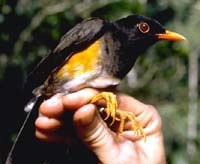This complex theme deals primarily with interactions between organisms and the environmental factors that impact them, but to a greater extent between individual inanimate environmental factors.
innovations-report offers informative reports and articles on topics such as climate protection, landscape conservation, ecological systems, wildlife and nature parks and ecosystem efficiency and balance.

Sustainability may not be all it’s cracked up to be. That is the message in a recent paper by a hydrogeologist at Reading University . Michael Price argues that most human advances have been non-sustainable in the long term and that when we talk of ‘sustainable use’ we must define the period over which the use is planned or implemented.
Price identifies three major challenges currently facing Britain and the world. The first is that the climate, and with it the supply of water, is becoming

Scientists at the University of Plymouth have been developing methods to `close the loop` on waste and pollution, by finding waste products that can be used to improve soil / plant-growth conditions. At the Society for Experimental Biology conference in Swansea Dr Stuart Lane presented ways in which garden and industrial waste could be recycled to benefit the environment.
In collaboration with Ecological Sciences Limited, Dr Lane`s group investigated a horticultural growth substitute for pea

Asymmetric bodies fuel arguments over ecological risk.
Birds with one foot bigger than the other are showing signs of stress, say Belgian ecologists. The study backs the controversial idea that measuring body asymmetries could signal that a species is at risk.
Researchers at the University of Antwerp measured the feet of taita thrushes from three remaining pockets of their native forest in Kenya. Those from the most disturbed area showed eight times more difference between t

Plastic made of potato starch is a promising material for packaging, which is a big new application for starch plastics. This is shown in Åsa Rindlav-Westling’s doctoral dissertation, which was carried out in Paul Gatenholm’s research team in polymer technology at Chalmers University of Technology, Sweden.
Our huge quantities of refuse could be reduced and a greater proportion than today could be composted. Combustion of materials from oil, such as conventional plastics and fossil fuels, ra

The journal Nature has announced that a report claiming that genetically engineered DNA had found its way into wild Mexican corn should not have been published. The announcement, unveiled online last Thursday, came with two critiques of the study and a rebuttal by its authors. Though they are not retracting the original article Nature editor Philip Campbell states that the journal has decided to make the circumstances surrounding it clear and “allow our readers to judge the science for themselves.”

A new London research laboratory developing fresh solutions to the perpetual problems of how best to get rid of our waste has reopened its doors today after a UKP1.5 million facelift.
Researchers based in the new Roger Perry Environmental Engineering laboratory at Imperial College are behind a number of innovative new waste reclaim and reuse projects.
Over 60 London households are helping in one project to evaluate how effective home composting is at managing domestic solid waste, t